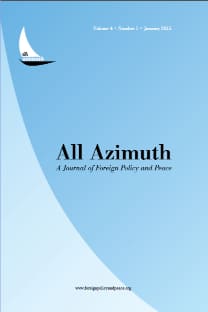Secrecy and the Study of International History: Missing Dimension in Turkish Foreign Policy
The study of international history largely depends on an exploitation of hitherto unexplored data. The sources of these data could vary from national archives to private papers to semi-structured interviews and so on. An examination of the historiography of Turkish Foreign Policy requires the employing of a rigorous methodology to unearth novel data to feed into current academic debates. Students of international history should be advised of possible logistic and methodological flaws and obstacles in the process. This article examines these logistical and methodological obstacles to conducting archival research for historiographical studies.
Keywords:
Historiography, secrecy, diplomacy, international history, intelligence Turkish foreign policy,
___
- Aldrich, Richard J. GCHQ: The Uncensored Story of Britain's Most Secret Intelligence Agency. London: Harper Press, 2010.
- ———. “‘Grow Your Own’: Cold War Intelligence and History Supermarkets.” Intelligence and National Security 17, no. 1 (2002): 135–52.
- ———. The Hidden Hand: Britain, America and the Cold War Secret Intelligence. London: Overlook, 2001. Aldrich, Richard J., and Rory Cormac. The Black Door: Spies, Secret Intelligence, and British Prime Ministers. London: William Collins, 2016.
- Alvarez, David. Bureaucracy and Cold War Diplomacy: The United States and Turkey 1943–1946. Thessaloniki: Institute of Balkan Studies, 1980.
- Andrew, Christopher M. Secret Service: The Making of the British Intelligence Community. London: Heinemann, 1985.
- Athanassopoulou, Ekavi. Turkey-Anglo-American Security Interests, 1945–1952: The First Enlargement of NATO. London: Routledge, 1999.
- Benjamin, Walter. On the Concept of History. Createspace Independent, 2009.
- Berridge, Geoffrey. British Diplomacy in Turkey, 1583 to the Present: A Study in the Evolution of the Resident Embassy. Leiden: Brill, 2009.
- ———. Diplomacy: Theory and Practice. Bansington: Routledge, 2010.
- Bezci, Egemen. Turkish Intelligence and the Cold War: Espionage, Security and International Relations. London: IB Tauris, 2018.
- Bezci, Egemen B., and Güven Gürkan Öztan. “Anatomy of the Turkish Emergency State: A Continuous Reflection of Turkish Raison d’état between 1980 and 2002.” Middle East Critique 25, no. 2 (2016): 163–79.
- Calis, Saban. Turkey's Cold War: Foreign Policy and Western Alignment in the Modern Republic. London: IB Tauris, 2017.
- Cormac, Rory. Confronting the Colonies: British Intelligence and Counterinsurgency. Oxford: Oxford University Press, 2014.
- Davies, Philip, and Kristian C. Gustafson, eds. Intelligence Elsewhere: Spies and Espionage outside the Anglosphere. Washington: Georgetown University Press, 2013.
- Davies, Philip. “Spies as Informants: Triangulation and the Interpretation of Elite Interview Data in the Study of the Intelligence and Security Services.” Politics 21, no. 1 (2001): 73–80.
- Elman, Colin, and Miriam Fendius Elman. “Diplomatic History and International Relations Theory: Respecting Difference and Crossing Boundaries.” International Security 22.1 (1997): 5–21.
- Elman, Colin, and Miriam Fendius Elman. “The role of history in international relations.” Millennium 37, no. 2 (2008): 357–64.
- Gingeras, Ryan. Heroin, Organized Crime, and the Making of Modern Turkey. Oxford: Oxford University Press, 2014.
- Gunter, Michael. “Turkey, Kemalism, and the ‘Deep State’.” In Conflict, Democratization, and the Kurds in the Middle East, edited by M.Gürses and D. Romano, 17–39. New York: Palgrave, 2014.
- Haber, Stephen H., David M. Kennedy, and Stephen D. Krasner. “Brothers under the Skin: Diplomatic History and International Relations.” International Security 22, no. 1 (1997): 34–43.
- Hale, William. Turkish Foreign Policy since 1774. London: Routledge, 2012.
- Hobden, Stephen, and John M. Hobson, eds. Historical Sociology of International Relations. Cambridge University Press, 2002.
- Kuniholm, Bruce R. The Origins of the Cold War in the Near East: Great Power Conflict and Diplomacy in Iran, Turkey, and Greece. Princeton: Princeton University Press, 1980.
- Martel, Gordon, ed. A Companion to International History 1900–2001. Oxford: Blackwell, 2008.
- Popper, Karl Raimund. The Poverty of Historicism. London: Routledge, 2002.
- Rezk, Dina. “Orientalism and Intelligence Analysis: Deconstructing Anglo–American Notions of the ‘Arab’.” Intelligence and National Security 31, no. 2 (2016): 224–45. Roberts, Geoffrey. “History, Theory and the Narrative Turn in IR.” Review of International Studies 32, no. 4 (2006): 703–14.
- Rovner, Joushua. Fixing the Facts: National Security and the Politics of Intelligence. Ithaca: Cornell University Press, 2011. Rubin, BM. Istanbul Intrigues (New York: Pharaoh Books, 1992). Salamon, Kim. “What is the Use of International History?” Journal of Peace Quarterly 30, no. 4 (1993): 375–89.
- Schroeder, Paul W. “History and International Relations Theory: Not Use or Abuse, But Fit or Misfit.” International Security 22, no. 1 (1997): 64–74.
- Slater, Dan, and Erica Simmons. “Informative Regress: Critical Antecedents In Comparative Politics.” Comparative Political Studies 43, no. 7 (2010): 886–917.
- Söyler, Mehtap. The Turkish Deep State: State Consolidation, Civil–military Relations and Democracy. London: Routledge, 2015. Tamkin, Nicholas. Britain, Turkey, and the Soviet Union, 1940–45: Strategy, Diplomacy, and Intelligence in the Eastern Mediterranean. London: Palgrave, 2009. Trachtenberg, Marc. The Craft of International History: A Guide to Method. Princeton: Princeton University Press, 2009.
- Unger, David. The Emergency State: America's Pursuit of Absolute Security at All Costs. New York: Penguin, 2012.
- Van Puyvelde, Damien, and S. Curtis. “‘Standing on the Shoulders of Giants’: Diversity And Scholarship in Intelligence Studies.” Intelligence and National Security 31, no. 7 (2016): 1040–54.
- Yilmaz, Suhnaz. Turkish–American Relations, 1800–1952: Between the Stars, Stripes and the Crescent. London: Routledge, 2015.
- Young, John W., and John Kent. International Relations since 1945. Oxford: Oxford University Press, 2013.
- ISSN: 2146-7757
- Yayın Aralığı: Yılda 2 Sayı
- Başlangıç: 2012
- Yayıncı: Dış Politika ve Barış Araştırmaları Merkezi, İhsan Doğramacı Barış Vakfı
Sayıdaki Diğer Makaleler
Broadening the Horizons of the “International” by Historicizing it: Comparative Historical Analysis
Discourse Analysis: Strengths and Shortcomings*
Bahar Rumelili SANCAK, Senem AYDIN DÜZGİT
Emre HATİPOĞLU, Osman Zeki GÖKÇE, İnanç ARIN, Yücel SAYGIN
Reflecting on the Reflectivist Approach to Qualitative Interviewing
